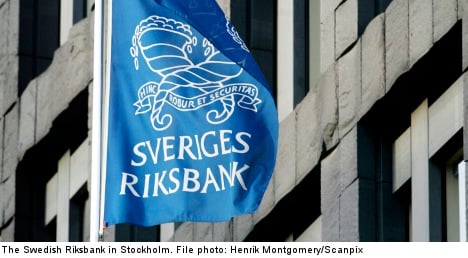“Anything other than an unchanged rate would have been a surprise,” Heidi Elmér, head economist at Skandia bank, told the TT news agency.
In its previous interest rate prognosis, the Riksbank forecast that the repo rate would be at 1.25 percent by the end of 2014, but Thursday’s interest rate decision forecasts the interest rate will only be at 1.15 percent.
However, the Riksbank was generally upbeat in its prognosis for the Swedish economy, despite forecasting slightly lower growth.
“Following the slowdown in recent years, the outlook for the Swedish economy is brightening. There has been some improvement in the labour market and this is expected to become clearer during 2014,” the central bank said in a statement.
“There are signs of an improvement in the euro area and the recovery in the United States is continuing. However, major challenges still remain.”
Previously, the Riksbank had forecast the Swedish economy would grow by 1.2 percent in 2013, but that figure has been adjusted downward to 0.7 percent. Economic growth is expected to pick up in 2014, landing at 2.6 percent, before inching up to 3.5 percent in 2015, figures more or less on par with the Riksbank’s previous forecasts for the years ahead.
The Riksbank set the continued economic recovery abroad will have positive effects on the export-dependent Swedish economy and that low interest rates and expansionary fiscal policy will help buoy Swedish consumer spending.
“Growth in Sweden is thus expected to be gradually higher, which means that employment will rise at a faster pace and unemployment will fall,” the Riksbank said.
Riksbank Deputy Governors Karolina Ekholm and Martin Flodén entered reservations against the decision to keep the repo rate at one percent, arguing it should be lowered to 0.75 percent.
While some have criticized the Riksbank for keeping interest rates too high, Skandia’s Elmér thinks the bank made the right decision.
“It’s clear there are reasons to lower it a step, when looking at inflation. But we see signs that the economy is beginning to heat up. Then there are other factors like imbalances among households, with high debts and home prices that are creeping up. In this case, I think we should wait to change rates,” she said.
TT/The Local/dl



 Please whitelist us to continue reading.
Please whitelist us to continue reading.
Member comments